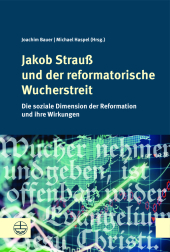 Neuerscheinungen 2018Stand: 2020-02-01 |
Schnellsuche
ISBN/Stichwort/Autor
|
Herderstraße 10
10625 Berlin
Tel.: 030 315 714 16
Fax 030 315 714 14
info@buchspektrum.de |

Joachim Bauer, Michael Haspel
(Beteiligte)
Jakob Strauß und der reformatorische Wucherstreit
Die soziale Dimension der Reformation und ihre Wirkungen
Herausgegeben von Bauer, Joachim; Haspel, Michael
2018. 320 S. m. 61 Abb. 23 cm
Verlag/Jahr: EVANGELISCHE VERLAGSANSTALT 2018
ISBN: 3-374-05150-2 (3374051502)
Neue ISBN: 978-3-374-05150-2 (9783374051502)
Preis und Lieferzeit: Bitte klicken
In der Reformationszeit spielt die Auseinandersetzung über den Zins und den Wucher eine bedeutsame Rolle. 1523 veröffentlichte der Eisenacher Reformator Jakob Strauß 51 Artikel gegen den Wucher, in denen er sich gegen überhöhte Zinsen auf Geld und Land ausspricht. Viele Bürger waren überschuldet, und Strauß versuchte, mit Hilfe dieser Artikel Gerechtigkeit zu schaffen. Für ihn ging es um die Frage, welches Handeln aus dem Glauben folgt. Strauß hat seine Artikel gegen den Wucher biblisch begründet. Vielleicht haben viele Menschen in Eisenach und Mitteldeutschland gerade deshalb so enthusiastisch auf die Botschaft der Reformatoren gehört, weil die geistliche Freiheit auch Befreiung aus weltlichen Zwängen verhieß. Das Buch beleuchtet die sozialethische Dimension der Reformation und ihrer Wirkung bis in die heutige Zeit.
.
[Jakob Strauss and the Reformation Usury Controversy. The Social Dimension of Reformation and Its Historical Effects]
In the Reformation period the dispute over interest and usury played an important role. In the year 1523 the Eisenach Reformer Jakob Strauss published 51 articles against usury, in which he argued against excessive interest rates on money and land. Many citizens were overindebted and Strauss tried to create justice. For him the question was which actions would be the consequences of faith. In his articles against usury Strauss based his arguments on the bible. Maybe many people in Eisenach and Central Germany welcomed so enthusiastically the message of the reformers because spiritual freedom promised also a liberation from social constraints. The book sheds light on the social-ethical dimension of the Reformation and its historical effects up to the present day.


